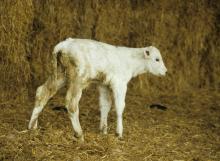The most likely diseases to cause scour are the viruses; Rota Virus and Corona Virus along with protozoa; Cryptosporidium and Coccidia and the bacteria; E. coli and Salmonella. As only two of these causative agents are bacterial, antibiotics are often not required.
The age at which the calf is affected will give an idea of the likely pathogen and therefore appropriate treatment;
- 1-3 days old is commonly bacterial in origin, therefore antibiotics may be appropriate
- 7-14 days are more likely to be affected by viruses and/or protozoa
- Mixed infections, for example with both rotavirus and cryptosporidia, are common
The best approach to treating scour appropriately is to bring a scour sample in to us to test.
Treatment:
- 2l oral electrolytes twice daily between milk feeds if the calf can stand.
- If the calf goes off milk, a one-off dose of Metacam can be helpful (being careful not to overdose as this can cause gut ulceration in an already inflamed gut).
- If bacteria is suspected as the cause then Duphatrim for 3 days would be an appropriate choice of antibiotic.
- If a calf is unable to stand or is not responding to treatment, then seek veterinary advice.
As always, prevention is better than cure. Hygiene, good colostrum management and good nutrition will prevent most cases of scour. Vaccination is also an option for those farms where rota and corona viruses are big problems.
For further information on calf scour, please see our fact sheet or contact us in the surgery - 01363 772860.
Danielle will also be running a pre-weaning calf workshop on 13th February, from 10am until 2pm. If you are interested in attending, please contact us at the surgery.


